
The Federal Ministry of the Interior, Building and Community, abbreviated BMI, is cabinet-level ministry of the Federal Republic of Germany. Its main office is in Berlin, with a secondary seat in Bonn. The current minister of the Interior, Building and Community is Horst Seehofer. It is comparable to the British Home Office or a combination of the US Department of Homeland Security and the US Department of Justice, because both manage several law enforcement agencies.

Austrian Standards International, abbreviated ASI, is a standards organization and the ISO member body for Austria.

The Main Directorate for Reconnaissance was the foreign intelligence service of the Ministry of State Security (Stasi), the main security agency of the German Democratic Republic, from 1955 to 1990.

Law enforcement in Austria is the responsibility of the Directorate General for Public Security, a subdivision of the Federal Ministry of the Interior located at Herrengasse 7 in Vienna. Over 20,000 police officers are on duty in the Federal Police at more than 1,000 police stations. On lakes and rivers the federal police has over 70 boats and other craft to act as the Water police.
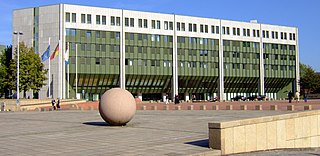
The Federal Minister for the Environment, Nature Conservation, and Nuclear Safety,, abbreviated BMU, is a cabinet-level ministry of the Federal Republic of Germany. It has branches in Bonn and Berlin.
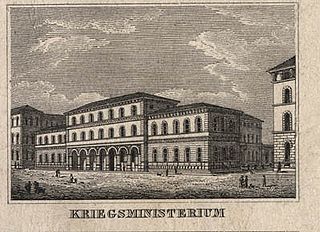
The Ministry of War was a ministry for military affairs of the Kingdom of Bavaria, founded as Ministerium des Kriegswesens on October 1, 1808 by King Maximilian I Joseph of Bavaria. It was located on the Ludwigstraße in Munich. Today the building, which was built by Leo von Klenze between 1824 and 1830, houses the Bavarian public record office, Bayerisches Hauptstaatsarchiv und Staatsarchiv München.
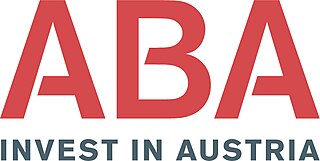
Austrian Business Agency is the national investment promotion company of the Republic of Austria. The organization is responsible for acquiring and providing professional consulting services to foreign companies that intend to establish a subsidiary or business operations in Austria. ABA provides information about Austria as a business location and advises companies on all relevant issues. The business settlement agency was founded as ICD Austria by the ÖIAG in 1982, and renamed Austrian Business Agency (ABA) in 1995. On the occasion of its 25th anniversary in 2007, ABA changed its corporate design and now uses the name ABA-Invest in Austria instead of Austrian Business Agency, because it shows more clearly the purpose of the company. ABA-Invest in Austria employs a staff of 25 people.
Association of German Chambers of Industry and Commerce is a German 'chamber,' similar to an English guild but is required under German law and provides political influence of a trade union. This organization was formerly known as the Deutscher Industrie- und Handelstag or DIHT.
EMP Merchandising also known as EMP Merchandising Handelsgesellschaft mbH, Large Popmerchandising, and Sweden Rock Shop is a German-based music mail order and merchandising store. The company distributes a quarterly catalog to customers. In a 2003 report, the Osnabrück Chamber of Commerce considered the company to be the largest mail order business for hard rock and heavy metal music in Germany. In September 2018, Warner Music Group acquired EMP from Sycamore Partners.

In Austrian politics, the Ministry of Education is the ministry in charge of schools, universities, and arts policy.
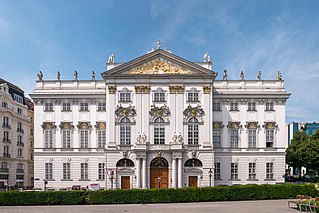
In Austrian politics, the Ministry of Justice is the ministry in charge of the administration of justice. The Ministry provides administrative supervision and payroll services for the court system and the prosecution service, manages their office buildings and facilities, and runs the prisons.

In Austrian politics, the Ministry of Transport in the ministry in charge of railways, transport policy, and the postal system.
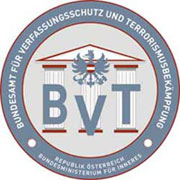
The Office for the Protection of the Constitution and Counterterrorism is an Austrian police organization that acts as a domestic intelligence agency. It is tasked with the protection of constitutional organs of the Republic of Austria and their ability to function. The agency was created from the Austrian State police, as well as various special task forces targeting organized crime and terrorism that were under the direction of the Directorate General for Public Security, which itself is a department of the Federal Ministry of the Interior. The BVT publishes the Verfassungsschutzbericht, an annual report on the status of the protection of the constitution.
Joseph Koeth was a German military officer and politician. During World War I he served as head of the commodity office in the Prussian Ministry of War created by Walther Rathenau. After the German revolution of 1918, Koeth was in charge of economic demobilisation as a member of the first democratically elected government under Philipp Scheidemann. He again served briefly as a minister of the Weimar Republic under Gustav Stresemann in 1923.

Georg Peter Hermann Eggert was a German architect. He designed important public buildings such as the Frankfurt Main Station and the New Town Hall in Hannover, often in the style of Neo-Renaissance.

In Austrian politics, the Ministry of Sustainability and Tourism is the ministry in charge of agricultural policy, forestry, hunting, fishing, viticulture and wine law, environmental protection, energy, mining, animal welfare, and the tourism industry. The Ministry was first created in 2000 through a merger of the Ministry of Agriculture (Landwirtschaftsministerium) and the Ministry of Environment (Umweltministerium); it gained responsibility for the energy sector, mining, and tourism under the first Kurz cabinet in 2018.

In Austrian politics, the Ministry of the Civil Service and Sport is the ministry in charge of public employment law, civil service job training, civil service staff representation, administration management in general, and sport.

In Austrian politics, the Ministry of Social Affairs (Sozialministerium) is the ministry in charge of welfare policy.

Margarete Schramböck is an Austrian business manager and politician. She is currently the Minister of the Economy in the Second Kurz government; she previously served in this position from December 2017 to June 2019 in the First Kurz government. From May 2016 to October 2017, she was the chief executive officer of A1 Telekom Austria. Schramböck is a member of the Austrian People's Party.
Work 4.0 is the conceptual umbrella under which the future of work is discussed in Germany and, to some extent, within the European Union. It describes how the world of work may change until 2030 and beyond in response to the developments associated with Industry 4.0, including widespread digitalization. The concept was first introduced in November 2015 by the German Federal Ministry of Labour and Social Affairs (BMAS) when it launched a report entitled Re-Imagining Work: Green Paper Work 4.0. It has since then been taken up by trade unions such as the DGB and various employers' and industry association such as the VDMA and the BDA. At the global level, similar topics are addressed by the World Bank's 2019 World Development Report The Changing Nature of Work and ILO's Future of Work Centenary Initiative.
















